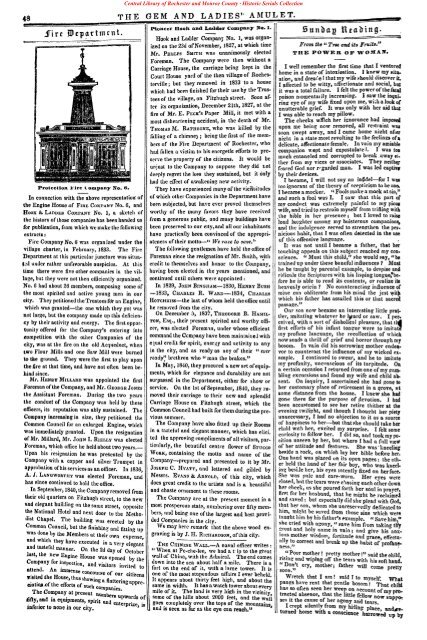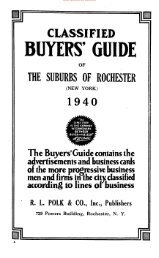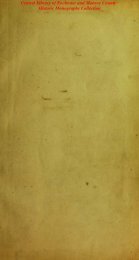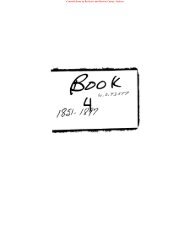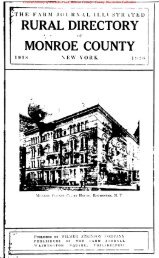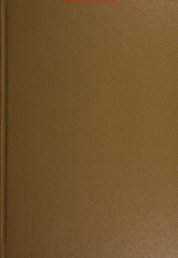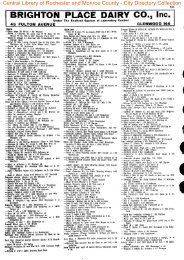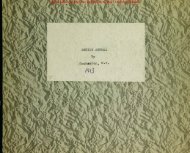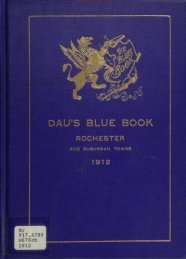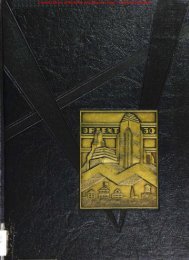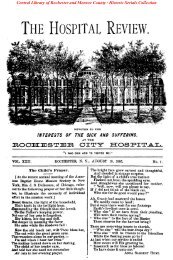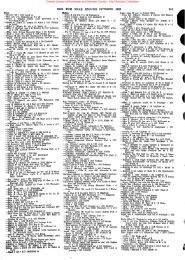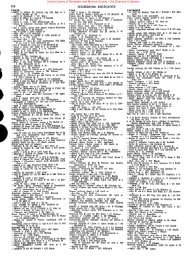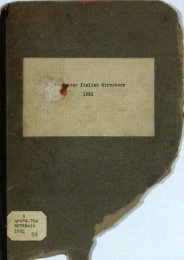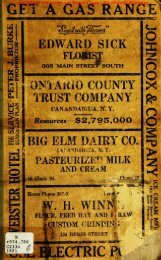LADIES' AMULET. - Monroe County Library System
LADIES' AMULET. - Monroe County Library System
LADIES' AMULET. - Monroe County Library System
Create successful ePaper yourself
Turn your PDF publications into a flip-book with our unique Google optimized e-Paper software.
48<br />
jfire Pcpartmmt.<br />
Protection. Kire Company No. 6.<br />
In connection with the above representation of<br />
the Engine House of FIIIE COMPANY NO. 6, and<br />
HOOK & LADDER COMPANY NO. 1, a sketch of<br />
the history of those companies has been handed us<br />
for publication, from which we make the following<br />
extracts:<br />
Fire Company No. 6 was organized under the<br />
village charter, in February, 1833. The Fire<br />
Department at this particular juncture was situated<br />
under rather unfavorable auspicies. At this<br />
lime there were five other companies in the village,<br />
but they were not then efficiently organized.<br />
No. 6 had about 26 members, composing some of<br />
the most spirited and active young men in our<br />
city. They petitioned the Trustees fdr an Engine,<br />
•which was granted—the one which they got was<br />
not large, but the company made up this deficiency<br />
by their activity and energy. The first opportunity<br />
offered for the Company's entering into<br />
competition with the other Companies of the<br />
city, was at the fire on the old Acqueduct, when<br />
two Flour Mills and one Saw Mill were burned<br />
to the gronnd. They were the first to play upon<br />
the fire at that time, and have not often been behind<br />
since.<br />
Mr. HENRY MILLARD was appointed the first<br />
Foreman of the Company, and Mr. GEORGE JONES<br />
the Assistant Foreman. During the two years<br />
the conduct of the Company was held by these<br />
officers, its reputation was ably sustained. The<br />
Company increasing in size, they petitioned the<br />
Common Council for an enlarged Engine, which<br />
wa6 immediately granted. Upon the resignation<br />
of Mr. Millard, Mr. JOHN I. RIELLY was elected<br />
Foreman, which office he held about two years.<br />
Upon bis resignation he was presented by the<br />
Company with a copper and silver Trumpet in<br />
approbation of his services as an officer. In 1836,<br />
A. J. LANGWORTHY was elected Foreman, and<br />
has since continued to hold the office.<br />
In September, 1840, the Company removed from<br />
tUeir old quarters on Fitzhugh street, to the new<br />
and elegant building on the same street, opposite<br />
the National Hotel and next door to the Methodist<br />
Chapel. The building was erected by the<br />
Common Council, but the finishing and fitting up<br />
was done by the Members at their own expense,<br />
and winch they have executed in a very elegan<br />
andtastefulmanner. On the 2d day of Octobe<br />
last, the new Engine House was opened by the<br />
Company for inspection, and visitors invited to<br />
tELiK<br />
9 "••>* 911UW1<br />
THE GEM AND <strong>LADIES'</strong> <strong>AMULET</strong>.<br />
ciu * ens<br />
eiatic*of the efforts of such vUIIipames<br />
The Company at present number8 „'<br />
«fty,aad in equipments, spirit and eaternri»<br />
inferior to none in our city. '<br />
Central <strong>Library</strong> of Rochester and <strong>Monroe</strong> <strong>County</strong> · Historic Serials Collection<br />
Pioneer Hook and Ladder Company No. 1.<br />
Hook and Ladder Company No. 1, was organized<br />
on the 23d of November, 1827, at which lime<br />
Mr, Pttixps SMITH was unanimously elected<br />
Foreman, The Company were then without a<br />
Carriage House, the carriage being kept in the<br />
Court House yard of the then village of Rqchesterville;<br />
but they removed in 1833 to a house<br />
which had been finished for their use by the Trustees<br />
of the village, on Fitzhugh street. Soon after<br />
its organization, December 21th, 1827, at the<br />
fire of Mr. E. PECK'S Paper Mill, it met with a<br />
most disheartening accident, in the death of Mr.<br />
THOMAS M. RATHBONE, who was killed by the<br />
falling of a chimne) ; being the first of the members<br />
of the Fire Department of Rochester, who<br />
had fallen a victim to his energetic efforts to preserve<br />
the property of the citizens. It would be<br />
unjust to the Company to suppose they did r.ot<br />
deeply regret the loss they sustained, but it only<br />
had the effect of awakening new activity.<br />
They have experienced many of the vicissitudes<br />
of which other Companies in the Department have<br />
been subjected, but have ever proved themselves<br />
worthy of the many favors they have received<br />
from a generous public, and many buildings have<br />
been preserved to our city, and all our inhabitants<br />
have practically been convinced of the appropriateness<br />
of their motto—" We raze to save.' 1<br />
The following gentlemen have held the office of<br />
Foreman since the resignation of Mr. Smith, with<br />
credit to themselves and honor to the Company,<br />
having been elected in the years mentioned, and<br />
continued until others were appointed:<br />
In 1829, JOHN BINGHAM—1830, HENRY BUSH<br />
—1833, CHARLES R. WARD—1834, CHARLES<br />
HOTCHKISS—the last of whom held the office until<br />
he removed from the cily.<br />
On December 5, 1837, THEODORE B. HAMIL-<br />
TON, Esq., their present spirited and worthy officer,<br />
was elected Foreman, under whose efficient<br />
command the Company have been maintained with<br />
eiual credit for spirit, energy and activity to any<br />
in the city, and as ready as any of their " ever<br />
ready" brethren who " man the brakes."<br />
In May, 1840, they procured & new set of equipments,<br />
which for elegance and durability are not<br />
surpassed in the Department, either for show or<br />
service. On the 1st of Sepiember, 1840, they removed<br />
their carriage to their new and splendid<br />
Carriage House on Fitzhugh street, which the<br />
Common Council had built for them during the previous<br />
summer.<br />
The Company have also fitted up their Rooms<br />
in a tasteful and elegant manner, which has elici.<br />
ted the approving compliments of all visitors, particularly,<br />
the beautiful centre flower of STUCCO<br />
WORK, containing the motto and name of the<br />
Company—prepared and presented to it by Mr.<br />
JOSEPH C. HYATT, and lettered and gilded by<br />
Messrs. EVANS & ARNOLD, of this city, which<br />
does great credit to the artists and is a beautiful<br />
and chaste ornament to these rooms.<br />
The Company are at the present moment in a<br />
most prosperous state, numbering over fifty members,<br />
and being one of the largest and best provi-<br />
ded Companies in the city.<br />
We may here remark that the above wood engraving<br />
is by J. H. RICHARDSON, of this city.<br />
THE CHINESE WALL.—A naval officer writes :<br />
" When at Pe-che-lee, we had a t ip to the great<br />
wall of China, with the Admiral. Thecnd comes<br />
down into the sea about half a mile. There is a<br />
fort on the end of it, with a larse tower. It is<br />
one of the most stupendous affairs I ever beheld.<br />
It appears about thirty feet high, and about the<br />
same in width. It ha9 a watch tower about every<br />
mile of it. The land is very high in the vicinity<br />
some of the hills about 2000 feet, and the wall<br />
goes completely over Ihe tops of the mountains<br />
and is seen as fur as the eye can reach." '<br />
Sun bag 11<br />
From the « Tree and its Fruits."<br />
THE! POWER OF<br />
I well remember the first time that I ventured<br />
home in a state of intoxication. I knew ray situation,<br />
and dreare i that my wife should discover it.<br />
I affected to be witty, affectionate and social, bat<br />
it was a total failure. I felt the power of the fatal<br />
poison nioraentaiily increasing. I saw the inqui.<br />
ring eye of my wife fixed upon me, with a look of<br />
unutterable grief. It was only with her aid that<br />
I was able to reach my pillow.<br />
The checks wtfich her ignorance had imposed<br />
upon me being now removed, all restraint wag<br />
soon swept away, and I came home niffht afier<br />
night in a state most revolting to the feelings of a<br />
delicate, affectionate female. In vain my amiable<br />
companion wept and expostulate!. I was tog<br />
much enlanaled and corrupted to break away ei.<br />
ther from my vices or associates. They neither<br />
feared God nor regarded man. I was led capliv?<br />
by their devices.<br />
I became, I will not say an infidel—for I was<br />
loo ignorant of the theory of scepticism to be one,<br />
I became a mocker. '< Fools make a mock at sin,"<br />
and such a fool was I. I saw that this part of<br />
my conduct was extremely painful to ray piouj<br />
wife, and tried to restrain myself from trifling with<br />
the bible in her presence; but I loved to raise<br />
loud laughter among my boisterous companion^,<br />
and the indulgence served to strengthen Ihe per-,<br />
nicious habit, that I was often detected in the use<br />
of this offensive language.<br />
It was not until I became a father, that her<br />
touching appeals on this subject reached my conscience.<br />
" Must this child," she would say, "be<br />
trained up under these baneful influences ? Must<br />
he be taught by parental example, to despise and<br />
ridicule the Scriptures with his lisping longue*before<br />
he is able to read its contents, or realize its<br />
heavenly orisrin ? No counteracting influence of<br />
mine can obliterate from his mind ihe jest with<br />
which his father has assailed this or that sacred<br />
passage."<br />
Our son now became an interesting little prattler,<br />
imitating whatever he tyeard or saw. I per*<br />
ceived, with a sort of diabolical pleasure, that tldl<br />
first efforts of his infant tongue were to imitate<br />
my profane language, the recollection of which<br />
now sends a thrill of grief and horror through my<br />
bosorn. In vain did his sorrowing mother endeavor<br />
to counteract the influence of my wicked example.<br />
I continued to swear, and he to imitate<br />
my profanity, unconscious of its turpitude. On<br />
a certain occasion I returned from one of my gambling<br />
excursions and found my wife and child ab*<br />
sent. On inquiry, I ascertained she had gone to<br />
her customary place of retirement in a grove, at<br />
some distance from the house. I knew she had<br />
gone there for the purpose of devotion. I bad<br />
been accustomed to see her retire thither at the<br />
evening twilight, and though I thought her piety<br />
unnecessary, I had no objection to it as a source<br />
of happiness to her—but that she should take her<br />
child with her, excited my surprise. I felt some<br />
curiosity to follow her. I did so, and took my position<br />
unseen by her, but where I had a full view<br />
of her attitude and features. She was kneeling<br />
beside a rock, on whioh lay her bible before her.<br />
One hand was placed on its open pasres; the other<br />
held the hand of her fair boy, who was kneelin?<br />
besiJe her, his eyes intently fixed on her face.<br />
She was pale and care-worn. Her eyes were<br />
closed, but the tears were chasing each other down<br />
her cheek, as she poured forth her soul in prayer,<br />
first for her husband, that he might be reclaimed<br />
and saved ; but especially did she plead with God,<br />
that her son, whom she unreservedly dedicated to<br />
him, might be saved from those sins which were<br />
taught him by his father's example. « Save him,"<br />
she cried with agony, « save him from taking thy<br />
creat and holy name in vain; and give his'anx-<br />
IOUS mother wisdom, fortitude and grace, effectually<br />
to correct and break up the habit of profaneness.<br />
><br />
" Poor mother! pretty mother!» said the child,<br />
rising and wiping off the tears with his soft hand.<br />
"Don't cry, mother; lather will come pretty<br />
soon." l '<br />
Wretch that I am! said I to myself. What<br />
pangs have rent that gentle bosom'! That child<br />
has so often seen her weep on nccoant of my protracted<br />
absence, that the little fellow now supposes<br />
it the cause of her agony and tears '<br />
I crept silently from my hiding place a<br />
turned home with a conscience hirow'ed up


